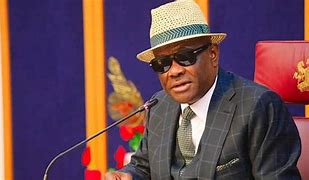Nyesom Wike’s face is now hot cake.
In Abuja these days, lobbying doesn’t always happen in hushed offices or smoky hotel lounges. Sometimes, it stares you right in the face on a giant billboard.
For months now, the face of Nyesom Wike, Minister of the Federal Capital Territory (FCT), has dominated the city’s skyline. His image is plastered across strategic intersections, highways, and roundabouts, often flanked by captions celebrating his projects. At first glance, you might assume he is gearing up for an election. But insiders say the real audience isn’t voters, it’s the minister himself.
Contractors and politicians are increasingly using outdoor advertising as a not-so-subtle way of courting favour. In Abuja, billboards are fast becoming the new letter of introduction, a public CV for those seeking a slice of government contracts.
One name keeps popping up in this billboard economy: Suleman Chok, popularly known as “BABS.” His handiwork dots Jahi, Kado, Maitama, Garki, and even the busy Airport Road, with slogans like “Support Mr. Infrastructure for Re-building Africa’s Fastest Growing Federal Capital.” The irony? Many of the projects celebrated on his boards aren’t actually his. Still, the billboards serve their purpose—signalling loyalty, admiration, and availability for the next contract.
The strategy isn’t cheap. According to the Department of Outdoor Advertisement and Signage (DOAS), renting a billboard in Abuja ranges from ₦500,000 to over ₦1 million for six months, depending on size, message, and location. For lobbyists placing dozens at once, the costs easily run into tens of millions.
“Fifty boards for half a year could set you back ₦25 million to ₦50 million,” a DOAS official said according to Daily Trust. And while campaign ads and product promotions carry higher tariffs, showcasing “government achievements” is still pricey enough to qualify as an investment. One that contractors hope pays off in future allocations.
What Abuja is witnessing is less about advertising and more about optics: the transformation of billboards into a new lobbying tool. In a city where access is everything, the walls are literally speaking.
In Abuja these days, lobbying doesn’t always happen in hushed offices or smoky hotel lounges. Sometimes, it stares you right in the face on a giant billboard.
For months now, the face of Nyesom Wike, Minister of the Federal Capital Territory (FCT), has dominated the city’s skyline. His image is plastered across strategic intersections, highways, and roundabouts, often flanked by captions celebrating his projects. At first glance, you might assume he is gearing up for an election. But insiders say the real audience isn’t voters, it’s the minister himself.
Contractors and politicians are increasingly using outdoor advertising as a not-so-subtle way of courting favour. In Abuja, billboards are fast becoming the new letter of introduction, a public CV for those seeking a slice of government contracts.
One name keeps popping up in this billboard economy: Suleman Chok, popularly known as “BABS.” His handiwork dots Jahi, Kado, Maitama, Garki, and even the busy Airport Road, with slogans like “Support Mr. Infrastructure for Re-building Africa’s Fastest Growing Federal Capital.” The irony? Many of the projects celebrated on his boards aren’t actually his. Still, the billboards serve their purpose—signalling loyalty, admiration, and availability for the next contract.
The strategy isn’t cheap. According to the Department of Outdoor Advertisement and Signage (DOAS), renting a billboard in Abuja ranges from ₦500,000 to over ₦1 million for six months, depending on size, message, and location. For lobbyists placing dozens at once, the costs easily run into tens of millions.
“Fifty boards for half a year could set you back ₦25 million to ₦50 million,” a DOAS official said according to Daily Trust. And while campaign ads and product promotions carry higher tariffs, showcasing “government achievements” is still pricey enough to qualify as an investment. One that contractors hope pays off in future allocations.
What Abuja is witnessing is less about advertising and more about optics: the transformation of billboards into a new lobbying tool. In a city where access is everything, the walls are literally speaking.
